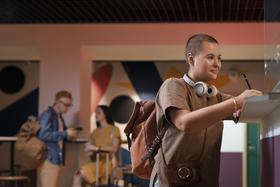Read more details about Miss Hall's School on their 2025-26 profile page.
Reflections and Advice:
1.) What do you think makes your school unique relative to other boarding schools?
The Horizon's Program is an aspect of Miss Halls that stands out as unique. 10-12th graders apply to off-campus internships that they attend once a week on Thursday mornings. These internships provide real-world experience that might otherwise evade boarding students during the year and they give students an edge in college applications. Freshmen stay on campus and learn entrepreneurial skills.
2.) What was the best thing that happened to you in boarding school?
I am definitely more self-reliant as a result of going to this school. Everything that happened to me made me stronger, smarter, and a more well-rounded and mature version of who I was when I started school there. I was very open about certain aspects of my identity there and the community was very accepting and encouraging about it. While some students and teachers were less tolerant, it was cool to be nice about different identities there.
3.) What might you have done differently during your boarding school experience?
I would have started as a freshman-- I came in junior year and never fully felt at home. It is a close-knit community and I am not that strong socially. Everyone had been friends for two years already, but there were people who came in at the same time who found their crew immediately, so I guess it's more about who you are.
4.) What did you like most about your school?
I liked how inclusive it was-- being yourself was the the coolest thing you could possibly be. Everyone felt like they had a place there.
5.) Do you have any final words of wisdom for visiting or incoming students to your school?
Honestly, the best piece of advice I could possibly give is to accept that you're not going to have that quintessential, all-american High School Experience. Accept that it's not a bad thing and that you're probably better off for it. Don't worry about it, and study hard, play hard, work hard. It's not perfect, but it's a good school and you will get as much out as you put in.
Spend as much time as possible in the greenhouse, get off of campus as much as possible. Hike all of the time. Try not to waste all your money on hot fries at the school store.
Academics:
1.) Describe the academics at your school - what did you like most about it?
The classes were on a block schedule, which helped break up the monotony that can often set in when you're going to the same classes in the same order for a whole semester. Students take 5 or 6 classes, which allows them 1 or 2 free blocks with which they can do whatever they want or need to (as long as they stay on campus).
What I liked most was the teachers. The overwhelming majority of the teachers really cared about what they were teaching and their students. While some students got competitive, they were few and far between and it often felt like everyone was working together. The workload was heavy and challenging, but the atmosphere of camaraderie made it not only do-able, but fun.
Athletics:
1.) Describe the athletics at your school - what did you like most about it?
Athletics were not particularly emphasized. However, it was required that every student participated in two out of three available seasons, and at least one of those had to be a team sport. There is no track and field, but there is an athletic center with machines and basketball and volleyball courts. If a student was not particularly athletically inclined, it was easy to find a sport that suited that. Most teams were more focused on being active and having a good time than they were with winning. Once a semester, the entire school got the day off to participate in scheduled wellness workshops that ranged from healthy eating to hiking to zumba/ yoga sessions.
Art, Music, and Theatre:
1.) Describe the arts program at your school - what did you like most about it?
There is a spacious art studio that all students have access to and are more than welcome to use, and a lot of students will take advantage of this. The art classes are informative and I feel that I grew as an artist as a direct result of them.
The music program is great and only getting better. The music practice rooms are equipped with a piano or keyboard and one has a drumset. The main room has a drum set as well, in addition to guitars, basses, amplifiers, and ukuleles that students can borrow to practice on. Bands can meet with the music teacher in order to get better, learn new songs, or even record. There is also a songwriting program where students can learn to write, record, and produce original songs.
The theatre was stressful at times, but an overall great experience that I am glad to have had. It was a fairly inclusive community in which anyone willing to put in the work with a positive attitude was able to participate (and those who would rather bully than participate effectively are firmly asked to leave-- I considered the theatre to be a refuge during extremely stressful days; it was a safe place). There was always something for everyone and the director is talented and very encouraging of more timid students.
Extracurricular Opportunities:
1.) Describe the extracurriculars offered at your school - what did you like most about it?
There's a plethora of clubs that students can get involved in, and involvement can be deep, wide, both, or neither. There is no pressure to participate. The GSA was the only organization I really participated in, and it was a student-led discussion in which topics like school policy, ally-ship, ways to navigate life as someone who does not identify as straight/cisgender, ect. were broached. However, I was heavily involved in music and theatre and did not get that involved in clubs as a result.
Dorm Life:
1.) Describe the dorm life in your school - what did you like most about it?
It was nice to live with all of my friends, because if there was homework that I did not understand, I could sneak over to their rooms to ask (or just hang out if I was bored). In room time/ the wifi turning off every night was probably the bane of my existence, but looking back it was pretty reasonable, although adjustment to it often meant that someone as absentminded as myself often forgot to grab a snack, shower in time, or get all the homework I needed to complete. However, the proctors were pretty reasonable if you got back late because of a game or a rehearsal.
The dorms themselves were nice, and I hear that the new dorm is even nicer. The set-up was functional and did not feel crowded. Switching rooms was unheard of-- if you didn't mesh well with your roommate, you mostly just avoided the room (which was do-able), but students in extreme situations can change rooms.
Dining:
1.) Describe the dining arrangements at your school.
Brunch was great. There was a waffle machine, and usually fresh fruit and some sort of pastry. There was always apples available to hungry students, regardless of the time, and on the weekends there was often a snack put out at night. You can sit wherever you want, but cellphones and laptops aren't allowed during meal hours. Breakfast during the week is relatively early (7:30-8:30), but there are bagels available until Lunch starts (11:20).
Social and Town Life:
1.) Describe the school's town and surrounding area.
Miss Halls is in Pittsfield, MA, a fairly populous town, and very close to Lenox, a more fancy but smaller town. The nearest (sizeable) mall was an hour away, but you can pretty much get anything you need during weekend excursions to places like CVS, the supermarket, the movies, and local festivals. Most boarding students did not have the time or means (you have to be signed out by an adult not enrolled in the school) to get out much, but it's pretty nice when the opportunity presents itself.
2.) Describe the social life at your school - what did you like most about it?
It's a small school, so you know everyone, and most people are nice to everyone as a result. It was a bit of a culture shock coming from a large public school, but it's uncommon not to acknowledge an acquaintance when you see them. If you're friendly, people will be friendly towards you. The community is very intolerant of bullying.
Daily Schedule:
Weekday
7:00 AM
Wake Up
7:30 AM
Breakfast Begins
8:00 AM
First Class
11:30 AM
Lunch Begins
3:15 PM
Most Classes End
4:00 PM
Athletics/ Theatre Rehearsal
5:30 PM
Dinner
7:00 PM
Mandatory Study Hall Begins
9:00 PM
Study Hall Ends
10:00 PM
In-Room Time
Weekend
11:30 AM
Brunch with friends
1:00 PM
Off-campus outing
3:00 PM
Homework or socializing
5:30 PM
Dinner
7:00 PM
On campus activity (Saturday)
7:00 PM
Study Hall (Sunday)
11:00 PM
In-Room Time (Friday/ Saturday)
10:00 PM
In-Room Time (Sunday)
Read more details about Miss Hall's School on their 2025-26 profile page.
Alumni Reviews Review School
Review
Description
Hallmark courses are pretty unique. They were created in my senior year and are meant to be a sort of intellectual substitute for AP courses. I say intellectual because I don't think they give college. . .
Miss Hall’s offers a liberal-minded curriculum with incredible teachers. Many of the course offerings deviate from a traditional high school curriculum and focus on more abstract concepts. The horizons program is vital in both the. . .
One unique aspect of Miss Hall's is the horizons program. Freshman year, students stay on campus to participate in class bonding activities and learn interpersonal skills and social awareness. By senior year, students participate in. . .
Show more reviews (3 reviews)
Recent Articles

Balancing Boarding Life
A clear, practical guide to balancing boarding life and independence, offering transition tips for students and families in 2025.

Balancing Boarding Life and Independence: Student Transition Guide
A clear, practical guide to balancing boarding life and independence, offering transition tips for students and families in 2025.

Why Consider Boarding School in 2025: Updated Benefits & Realities
Explore why boarding school remains a compelling option in 2025—academic excellence, global exposure, personal growth, and evolving financial aid make it a powerful choice.





